人教版九年级英语Unit4单元知识点课件
人教版九年级上学期英语课件: Unit4(共29张PPT)

9、要学生做的事,教职员躬亲共做; 要学生 学的知 识,教 职员躬 亲共学 ;要学 生守的 规则, 教职员 躬亲共 守。21.7.2721.7.27T uesday, July 27, 2021
10、阅读一切好书如同和过去最杰出的人谈话。09:08:4009:08:4009:087/27/2021 9:08:40 AM 11、一个好的教师,是一个懂得心理学和教育学的人。21.7.2709:08:4009:08Jul-2127-Jul-21 12、要记住,你不仅是教课的教师,也是学生的教育者,生活的导师和道德的引路人。09:08:4009:08:4009:08Tuesday, July 27, 2021 13、He who seize the right moment, is the right man.谁把握机遇,谁就心想事成。21.7.2721.7.2709:08:4009:08:40July 27, 2021 14、谁要是自己还没有发展培养和教育好,他就不能发展培养和教育别人。2021年7月27日星期二上午9时8分40秒09:08:4021.7.27 15、一年之计,莫如树谷;十年之计,莫如树木;终身之计,莫如树人。2021年7月上午9时8分21.7.2709:08July 27, 2021 16、提出一个问题往往比解决一个更重要。因为解决问题也许仅是一个数学上或实验上的技能而已,而提出新的问题,却需要有创造性的想像力,而且标志着科学的真正进步。2021年7月27日星期二9时8分40秒09:08:4027 July 2021 17、儿童是中心,教育的措施便围绕他们而组织起来。上午9时8分40秒上午9时8分09:08:4021.7.27
2、Our destiny offers not only the cup of despair, but the chalice of opportunity. (Richard Nixon, American President )命运给予我们的不是失望之酒,而是机会之杯。二〇二一年六月十七日2021年6月17日星期四 3、Patience is bitter, but its fruit is sweet. (Jean Jacques Rousseau , French thinker)忍耐是痛苦的,但它的果实是甜蜜的。10:516.17.202110:516.17.202110:5110:51:196.17.202110:516.17.2021 4、All that you do, do with your might; things done by halves are never done right. ----R.H. Stoddard, American poet做一切事都应尽力而为,半途而废永远不行6.17.20216.17.202110:5110:5110:51:1910:51:19 5、You have to believe in yourself. That's the secret of success. ----Charles Chaplin人必须相信自己,这是成功的秘诀。-Thursday, June 17, 2021June 21Thursday, June 17, 20216/17/2021
人教版英语九年级上unit4单元全套优质课件
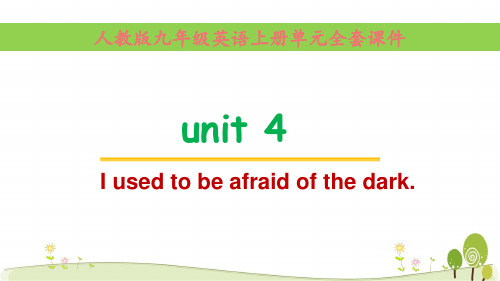
Listen again and complete the exercise.
Conversation 1 Bob is here with his __p_a_r_e_n_t_s____ and he hasn't seen Mario for __fo_u__r___ years.
Conversation 2 Amy used to be really tall because Bob was ___s_h_o_r_t __ in the past.
3. If you're happy, you can find your changes.
Look at the pictures and describe the people.
What does he/she look like?
short/ brown hair 短/棕色头发
long /black hair 长/黑头发
1. Mario used to be__sh_o_r_t_ . He used to wear_g_l_a_ss_e_s_.
2. Amy used to be__t_a_ll____. She used to have __sh_o_r_t__hair.
3. Tina used to haver_e_d___ andc_u_r_ly___ hair.
➢Make sentences
He/She used to be/have/wear…, but now he/she is/has/wears ….
short/tall
young/old
heavy/thin
➢ change in personality
V S
Unit 4(单元解读课件)九年级英语全一册(人教版)

Section B 2a-2f
05
语篇介绍了一位乡村少年的成长故事,记叙了其在 面对家庭变化时的情绪、行为变化以及这些变化对 主人公和家庭产生的影响。
单元重点知识
主题词汇
appear, personality ,humor ,silence ,helpful,interview, deal ,shyness,require ,public,Asian,African,European, British ,absent ,fail,examination ,exactly ,pride ,proud, general,introduction
have an
节信息。
庭变化时的情绪、 proud
influence on sb. 2.让学生明
take pride
白事物是不
行为变化以及这些 变化对主人公和家 庭产生的影响。
in ...=be proud of, have
communication
断发展的, 珍惜自己现 在的生活, 珍惜父母的
with
爱和现在的
学习机会。
课时内容解读 第六课时Section B 3a-self check 课例展示
单元主题:人与自我(做人与做事)
教材
Section B 3a-self check 第6课时
语篇 形式
写作
语篇内容
审视自己的成长过 程,更深刻地认识 自己。
核心词汇
本单元与学习 相关的词汇。
核心句型
技能与策略 学习要点
0 3 单元目标与课时安排
制定单元目标
统筹课时安排
人教版九年级英语 Unit 4 Section A(1a~2d) 精品课件

Now Appearance
3. What do you think of her?/ What is she like?
She is nice, friendly, active, ...
Look and talk
A: Did Mario use to be short? B: Yes, he did. He used to be really short. A: What’s he like now? B: He’s tall now.
Revision Pre-listening While-listening Post-listening Summary
Personality
Revision Pre-listening While-listening Post-listening
Summary
Brainstorm Can you think of more words or expressions about appearance and personality?
Appearance
Height tall, short, of medium height ...
Build heavy, slim, thin, of medium build ...
Other long straight hair, short curly hair, a round features face, big eyes, wear glasses ...
She used to have long straight hair, but now she has short straight hair.
初中人教版九年级上册英语第四单元课件PPT版

What does he/she look like?
tall/ good looking 高/相貌好看的
short/ handsome 矮/英俊的
strong /heavy 强壮的/重的
thin 瘦的
How can we describe the personality?
funny
quiet
outgoing
shy friendly serious
我们学过许多描述人的词语, 看谁想的又快又多。
Appearance: tall, short, fat, thin, young, old, straight hair, curly hair, long hair, short hair, a medium body Personality: outgoing, serious, funny, smart, friendly, shy, unfriendly
She used to be …, but now she is …
outgoing quiet
friendly funny shy smart serious active
…
1a Fill in the chart with words to describe people.
Appearance tall
1.Mario used to be__sh__o_rt_ . He used to wear_g_l_a_ss_e_s_.
2. Amy used to be__t_a_ll____. She used to have _s_h_o_r_t__hair.
3. Tina used to have__r_e_d_ and__c_u_r_l_y hair.
人教版九年级英语全册Unit4 SectionA 1a-2d课件

Summary
Billy ’s changes
In the past
Now
Personality He used to be __sh_y__a_n_d__q_u_ie_t_.
He is so _p_o_p_u__la_r_.
Appearance
He
used
to
be_t_h_in__a_n_d__w_e_a_r_g_l_a_s_se. s
Pairwork Mario used to be short .
Did Mario use to be short?
Yes, he did. He used to be really short.
What’s he like now?
He’s tall now.
Amy used to have short hair .
Did Amy use to have short hair?
Yes, she did. She used to have short hair.
What’s she like now?
She has long hair now.
Tina used to have red and curly hair .
tall
fat\heavy
short hair
love dancing
short
thin
curly hair
be good at running
of medium height of medium build straight hair like playing soccer
I am tall \ short .
sciIenucseethdantoI pdilda,yhathae. ApniadnIore,member you were really good in mubsuictcnlaossw, toIoa. mWamit oarmeininuttee!rDesidteydouinusseptooprtlasy.the piano?
人教版英语九年级全册Unit4复习课件
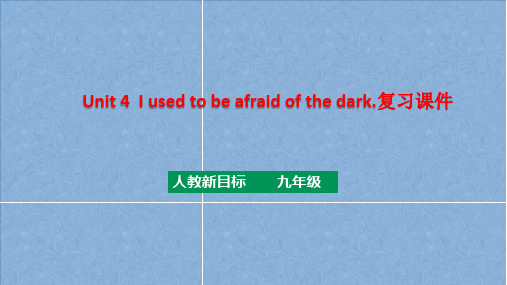
2. What’s he like now? 他现在什么样子? What +be +主语+like? 用来询问某人的外 貌特征,意为“…长什么样?”,相当于what do /does +主语+like? ►---What’s your brother like?=What does your brother like? 你哥哥张什么样? 辨析:be like 和look like be like: “像…一样”,常指品德、相貌等相像 ,
= I don’t know what they do with the problem.
2) 动词不定式短语 to deal with 后必须带宾语。 ► I don’t know how to deal with it.
我不知道如何处理这件事。
(3)shyness 名词,意为“害羞;腼腆”是形 容词shy 加后缀-ness 构成的名词。 ► He can’t get over his shyness. 拓展:sad -------- sadness
in the front of :“在…… 的前部”,强调在某一 物体内部的前面
(3)whole 形容词,意为“整个的;全部的”,常 用结构为“the+whole+单数名词”。all也有 此意,但语序不同:all用于冠词、所有格 或其他限定词之前;whole用于冠词、所有 格及其他限定词之后。
all the time
Grammar Focus
I used to be short
I didn’t use to be popular in school.
Paula used to be really quiet.
人教版英语九年级全册Unit 4-Unit 6复习课件
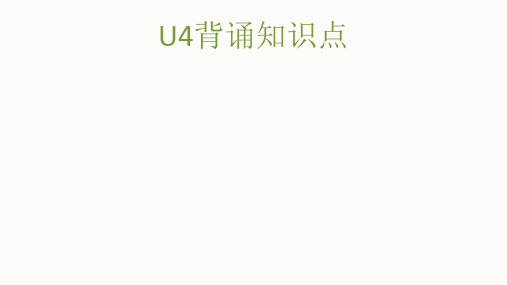
3. humorous adj. 有幽默感的,滑稽有趣的 变形: humor n.幽默
4.silent adj. 不说话的,沉默的 remain/stay/keep silent 保持沉默 in silence 安静地,无声地=silently n.silence 5.helpful adj.有用的,有帮助的,乐于助人的 be helpful to sb. 对某人有帮助
6.general adj.总的/普遍的/常规的 n. 将军---generally adv.一般地/普遍地 in general =generally speaking 一般来说
7.introduction n.介绍 brief introduction 简介 make an introduction 做介绍 introduce oneself自我介绍 introduce A to B 把A介绍给B
14. in the last /past +时间段 在过去的...里 15. be there for 随叫随到;不离……左右
U5背诵知识点
• chopsticks [ˈtʃɒpstɪks] n. 筷子 two pairs of chopsticks • coin [kɔɪn] n.硬币 corner n.角落 • fork [fɔ:k] n.餐叉 a knife and fork 一副刀叉(做主谓单) • a knife and a fork 一把刀和一个叉(做主谓复) • blouse [blaʊz] n.(女士)短上衣;衬衫 • silver [ˈsɪlvə] n. 银,银器; adj.银色的 silver hair银发 gold金 • glass [glɑːs] n.玻璃 玻璃杯 a piece of glass a glass of一杯.. • 眼镜 a pair of glasses • cotton [ˈkɒtn] n.棉;棉花不可数,mutton 羊肉不可数 • fair [feər] n. 展览会;交易会 • environmental [ɪnˏvaɪərənˈmentl] adj. 自然环境的;有关环境的
人教版九年级英语 Unit4 复习课件 (共15张ppt)
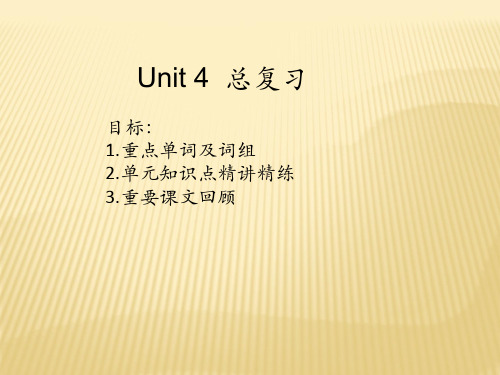
目标: 1.重点单词及词组 2.单元知识点精讲精练 3.重要课文回顾
Task 1: 请同学们翻到P159页,自读单词,然后听写。
Task 2: 词汇联想:
silent (adj.)---- n._s_i_le_n__c_e
helpful (adj.)---- v.&n._h_e_l_p_
3. deal with; do with处理,解决 deal—dealt—dealt, 同义短语为do with
deal with 与疑问词how连用,do with与疑问词what连用 eg. I don’t know how to deal with the problem.
=I don’t know what to do with the problem. 4. It is /has been + 时间 + since 从句 例如:It’s /has been three years since we met last. 自从我们上次 见面已有三年了。 5. fail 失败 fail (in) the exam 考试不及格; pass the exam通过考试
African----非洲_A__f_r_i_c_a__
British----英国__B_r_it_ia_n_/England examination----(缩写)_e_x_a__m_ v._e_x_a_m__i_ne exactly (adv.)----adj._e_x__a_c_t_ pride----adj._p_r_o_u_d__
he have short hair? Yes, he
No, he
反意疑问句:
She used to be shy,_____ _____? /
Unit 4单元重点单词短语讲解课件 人教版九年级英语全册

❖ 14. relax ❖ v. 让某人感到轻松 ❖ adj. relaxed/relaxing ❖ 15. strict ❖ adj. 严格的,严厉的 ❖ 常见搭配: ❖ be strict with sb 对某人要求严格 ❖ be strict in sth 对某事要求严格
❖ 16.fail ❖ v. 失败 ❖ 名词 failure 失败 ❖ 常见搭配: ❖ fail in doing 失败做某事 ❖ fail to do 未能做某事/忘记做某事
❖ 6. absent ❖ adj. 缺席的,不在场的 ❖ 词形变化: ❖ n. absence 缺席 ❖ 常见短语: ❖ be absent from 缺席,不参加...
❖ 7.general ❖ adj. 一般的,普通的 ❖ 词形变化: ❖ adv generally ❖ 常见搭配: ❖ in general 一般而言,大体上
❖ 8.helpful ❖ adj. 有用的,有帮助的 ❖ 词形变化:n/v help 帮助 ❖ 反义词 helpless 无帮助的,无用的 ❖ 常用搭配: ❖ be helpful to 对某人/某物有帮助 ❖ 9. seld0. advise ❖ v. 建议 ❖ 词形变化:n. advice 建议 ❖ 常用搭配: ❖ advise sb to do sth 建议某人做某事 ❖ advise doing 建议做某事
❖ 3. interview ❖ v. 采访 ❖ 词形变化: ❖ n. 记者 interviewer ❖ n. 被采访者 interviewee ❖ 4. private ❖ adj. 私人的 ❖ 反义词: public 公开的
❖ 5. influence ❖ n. 对某人、物产生的影响 ❖ v. 对某人、物产生影响 ❖ 常见短语: ❖ have an influence on sb. ❖ influence sb./sth. Computer has an influence on us. Computer influence us.
人教版九年级英语unit4第四单元全单元课件
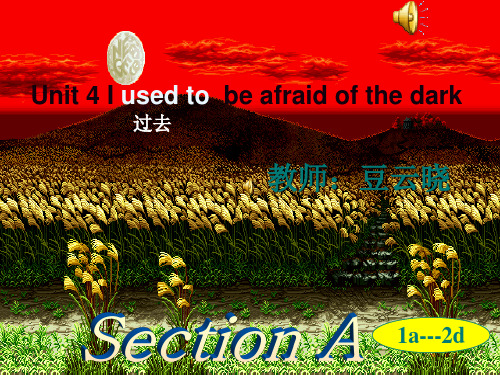
3. Tina used to have red and curly hair.
1c Look at the picture and make conversations.
A: Did XieTingfeng use to be short? B: Yes, he did. He used to be really short. A: What’s he like now?他现在长什么样子? B: He’s tall now.
11bb Listen. Bob is seeing some friends for the first time
in four years. What did his friends use to look like?
1. Mario used to be short . He used to wear glasses .
Now现在
what’s he like?
他长什么样子? /他什么性格?
He is tall.
shy
outgoing
=He used to be short, but now he is tall.
他过去是矮的,但是现在他是高的
He used to be shy , but now he is outgoing
他过去是内向的,但是他现在是外向的。
Step 2 New words
❖ humorous --humor (n.) 有幽默感的
❖ silent --silence (n.) 沉默的keep silent /in silence
❖ helpful -help (n.v.) 有用的, 有帮助的
人教版英语九年级课件unit4iusedtobeafraidofthedarksa3a-3c公开课(35张ppt)

deal v. 对待;处理 (dealt, dealt) deal with 应对;处理 e.g. Have you dealt with these letters yet? 这些信件你处理了吗? shy adj. 害羞的——shyness n. 害羞
2. As she got better, she dared to sing in front of her class, and then for the whole school. dare v. 敢于;胆敢 dare to do sth. 敢于做某事 e.g. Hedoesn’t dare to jumpfrom the top of the wall. 他不敢从墙上跳下来。
3.She used to
3.It’ism_p_o_s_s_ib__le___ for her
_ha_n_g__ou_t__with friends.
to stay with friends because
4_to._Sohhtoehwedrissdh.ne’apt puesaertswoo_r_ry__ab_o_utt4wh.hSeahrteeshhaaersestaoabyel_sw_vo_aer_ryd_yso_ce_gas_ur._ea_fru_d_l _as_.bout
Find the phrases
11.准备好做某事 12.放弃 13.继续奋斗 14.需要天赋和努力工作 15.许多 16.极少数
1.开始做某事 2.在人群前面 3.处理,应付 4.敢于做某事 5.不再 6.担心;担忧 7.得到太多的关注 8.私人时间 9.与朋友一起闲逛 10.准备好做某事
Find the phrases
Fast reading
人教版九年级英语上册课件:Unit 4单元知识归纳(共13张PPT)
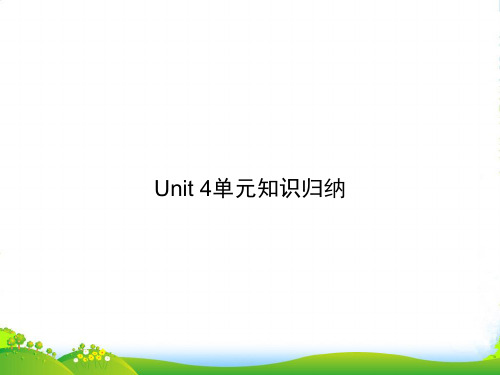
• 4.get good grades/ scores 取得好成绩 • 5.be interested in对…… 感兴趣 • 6.be on a swim team/be a member of
a swim team是一个游泳队员
• 7.from time to time/sometimes 时常; 有时
洲历史的书
• 28.pop/country/classic/rock music • 流行/乡村/经典/摇滚音乐
• 29.scary/action/love/story movies • 恐怖/动作/爱情/故事片 • 30.read at least six books a year一年
至少读6本书 • 31.give a speech 做一场演讲 • 32.in public 公开地;在别人(尤指生人)
某事
• 22.the road to success通向成功的道路
• 23.think about 考虑 • 24.fight on 继续战斗 • 25.a number of 大量的;许多 • 26.make it to the top成功登顶 • 27.books on European history 关于欧
面前
• 33.be nervous about对……感到紧张 • 34.take care of照顾 • 35.be absent from 缺席
• 36.fail examinations 考试失败 • 37.make a decision作出决定 • 38.boarding school 寄宿学校 • 39.in person亲身;亲自 • 40.take a 24-hour train 乘坐24小时的
再……
人教版九年级英语第四单元全单元课件
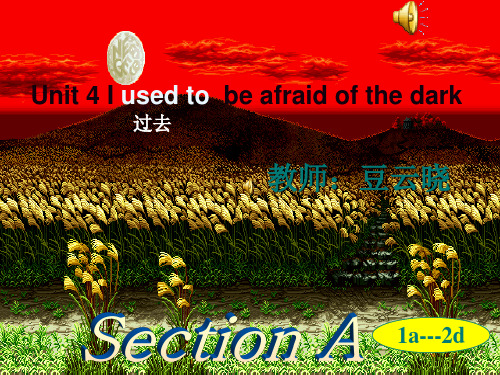
背景
interview Asian
Ne采w访、w面试ords 亚洲人、亚洲的
deal with
处理
shyness
害羞
dare
敢、胆敢
dare to do----dare do 敢于做某事
crowd
人群、
ton (n)
吨
tons of…
大量的
private
私人的、私立的
personal
个人的
guard
Yes , he did。
:(举办)这次聚会的注意实在是太棒 了!
我同意。从上次见到小学同学到现在已经三 年了。
:看到大家的变化还挺有趣的。 比利变化好大呀!他过去曾经那么羞涩、安 静。
:是啊,以前他和女生说话总是脸红。 :我以前看他每天在图书馆看书。
:那是因为他确实是个好学生,他学习 刻苦,以考试就得高分。
In the past
Now
Paula used to be really
1. Now she’s more
_q__u_ie_t. She was always
interested in _s_p_o_r_t_s.
silent in class. She wasn’t very _ou_t_g_o.ing She was
__√__ friendly _√___ outgoing
____ humorous _√___ silent
__√__ brave
_√___ quiet
____ serious
_√___ active
____ helpful
2b Listen again and complete the chart about how Paula has changed.
人教版九年级英语Unit4单元知识点课件
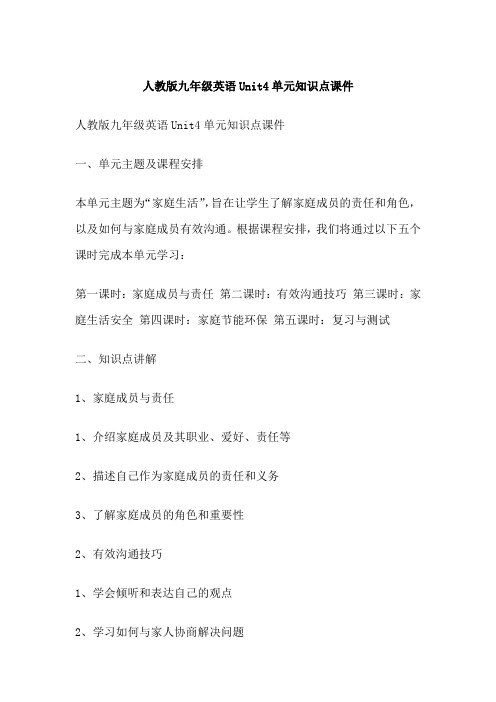
人教版九年级英语Unit4单元知识点课件人教版九年级英语Unit4单元知识点课件一、单元主题及课程安排本单元主题为“家庭生活”,旨在让学生了解家庭成员的责任和角色,以及如何与家庭成员有效沟通。
根据课程安排,我们将通过以下五个课时完成本单元学习:第一课时:家庭成员与责任第二课时:有效沟通技巧第三课时:家庭生活安全第四课时:家庭节能环保第五课时:复习与测试二、知识点讲解1、家庭成员与责任1、介绍家庭成员及其职业、爱好、责任等2、描述自己作为家庭成员的责任和义务3、了解家庭成员的角色和重要性2、有效沟通技巧1、学会倾听和表达自己的观点2、学习如何与家人协商解决问题3、掌握基本的礼貌用语和沟通技巧3、家庭生活安全1、了解家庭安全常识,如防火、防盗等2、学习如何预防家庭事故的发生3、认识家用电器安全隐患及应对措施4、家庭节能环保1、了解家庭能源消耗及环保措施2、学习如何减少家庭能源消耗,如节水、节电等3、认识环保产品及其使用方法三、语法重点及练习1、情态动词的使用:掌握can, may, must等情态动词的用法及区别2、现在完成时的用法:理解现在完成时的构成及用法,如表示过去发生的动作对现在的影响3、介词的使用:掌握in, on, at等介词的用法,如表示时间、地点等四、课堂活动设计1、小组讨论:分组进行,围绕家庭生活安全、节能环保等话题进行讨论,分享自己的经验和看法2、角色扮演:设定家庭生活场景,让学生扮演不同角色,如父母、子女等,进行有效的沟通练习3、课堂提问:鼓励学生提出疑问,通过课堂讨论和教师解答,加深学生对知识点的理解五、课后作业及测试1、完成练习册中本单元相关练习题,巩固课堂所学知识点。
2、写一篇关于“我的家庭生活”的小作文,描述自己在家庭生活中的责任和义务,以及如何与家庭成员进行有效沟通。
3、在课堂上进行单元测试,检测学生对本单元知识点的掌握情况。
六、教学评估与反馈1、通过学生课堂表现、作业完成情况和测试成绩,对学生的学习情况进行评估。
人教版九年级英语上册第四单元全部课件(优质)

_3___ Candy’s advice to young people
_1___ Candy’s background
3b Read the article again and complete the
sentences about Candy. 1. She used to be shy, but now she’s not
2d Read the conversation again and complete the blanks.
Bill has changed so much! He used to be _s_h_y_ and q__u_ie_t_. His face always t_u_r_n_e_d_ _re_d_ when he talked to girls! He studied hard and got good _s_co_r_e_s_ on his exams. He used to be _th__in_, but now he is _b_ig_ and _s_tr_o_n_g__.
Unit 4 I used to be afraid of the dark.
Section A 3a~4c
1.What do you think the girl in the picture is doing?
2. What’s in her hand?
3. What’s she like? Is she outgoing or shy?
1. Mario used to be _s_h_o_r_t_. He used to wear _g_l_a_ss_e_s_.
人教版九年级英语Unit4 SectionA(3a-4c)教学课件 (共28张PPT)

section A(3a-4c)
Learning aims
Aims of knowledge: to know the usage of key words and phrases like interview, Asian, deal with, etc.
interview
v,采访;面试 n,面试;访谈
Asian adj, 亚洲(人)的;n,亚洲人
deal
v,对付;对待
deal with
应对;处理
shyness
n, 害羞的,腼腆
dare crowd ton private guard require
v, 敢于;胆敢 n, 人群;观众 n,吨;(pl)大量;许多 adj. 私人的;私密的 n,警卫;看守 v,需要;要求
From Shy Girl to Pop Star
For this month’s Young World magazine, I interviewed 19-year-old Asian pop star Candy Wang. Candy told me that she used to be really shy and took up singing to deal with her shyness. As she got better, she dared to sing in front of her class, and then for the whole school. Now she’s not shy anymore and loves singing in front of crowds.
他不敢正眼看她。 ►She dared to walk at night. 她敢走夜路
人教版九年级英语 Unit 4 Section A(3a-4c)课件
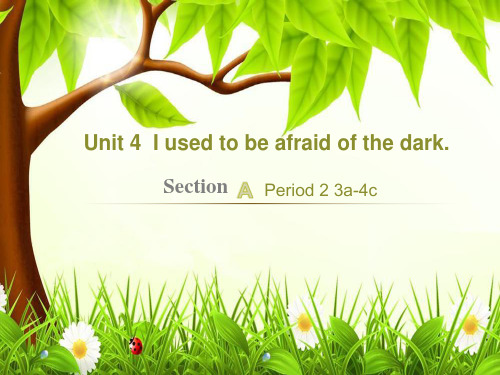
Use used to and now to
describe the following pictures.
I used to … But now I …
keep toys in order
Go home early Have a little homework
Go home late Much homework
4a Write sentences about the past
using used to.
2. my mom / have curly hair / have strMayigmhotm huasierd to have curly hair.
或:didn’t use to do
疑问形式为:Used … to …?
to …?
或:Did … use
You used to be quiet, didn’t you?
你以前很文静,是不是? 反意疑问句: 陈述句, didn’t / usedn’t +主语?
Talk about your own past and present
4. Sandy / teach British English / teach American English
Sandy used to teach British English. She didn’t use to teach American English.
4b Look at the information and write sentences about Emily.
- 1、下载文档前请自行甄别文档内容的完整性,平台不提供额外的编辑、内容补充、找答案等附加服务。
- 2、"仅部分预览"的文档,不可在线预览部分如存在完整性等问题,可反馈申请退款(可完整预览的文档不适用该条件!)。
- 3、如文档侵犯您的权益,请联系客服反馈,我们会尽快为您处理(人工客服工作时间:9:00-18:30)。
Unit 4 I used to be afraid of the dark. 易错提醒
栏目索引
He didn't pass the exam, did he?他没有通过考试,是吗? Yes, he did. 不,他通过了。(事Байду номын сангаас是肯定的) No, he didn't. 是的,他没有通过。(事实是否定的)
Unit 4 I used to be afraid of the dark.
栏目索引
例 (2019山东青岛市北区期中)Your voice is beautiful. Maybe you can singing as your future job.
A.take up B.put up C.set up D.make up
人教版九年级英语
Unit4 单元知识点课件
Unit 4 I used to be afraid of the dark.
栏目索引
Unit 4 I used to be afraid of the dark.
栏目索引
Section A
知识点一 反意疑问句的用法和结构 教材原文 Mario, you used to be short, didn't you?马里奥,你以前很矮, 是吗? 本句是反意疑问句,陈述部分含有used to do结构,附加问句要用助动词 did。反意疑问句由“陈述部分+附加问句”构成,陈述部分如果是肯定 形式,附加问句要用否定形式;陈述部分如果是否定形式,附加问句要用 肯定形式,可简单记忆为“前肯后否”和“前否后肯”。
C.does he;No, he doesn't D.does he;Yes, he does
解析 句意:——他不讲英语,也不讲日语,是吗?——是的,他不讲。他 讲汉语。本题考查反意疑问句及其答语。反意疑问句要遵循“前否后
肯,前肯后否”的原则。由doesn't可知第一个空应为does he。反意疑 问句的答语要根据事实作答,肯定回答用Yes+肯定结构,否定回答用No +否定结构。根据句意可知为否定回答,用No,he doesn't。故本题选 择C。 答案 C
解析 四个选项的含义分别是:take up开始从事,占用;put up搭建,张贴; set up成立;make up组成,编造。根据题干中的“你的嗓音很好听”可 推断,你可以把唱歌当作你未来的职业,故答案为A。 答案 A
Unit 4 I used to be afraid of the dark.
Unit 4 I used to be afraid of the dark.
栏目索引
知识点二 silent的用法及派生词 教材原文 She was always silent in class.她在课堂上总是很沉默。 silent作形容词,意为“不说话的;沉默的”。 The students all kept silent.The teacher didn't know what happened.学生 全都保持沉默,老师不知道发生了什么事情。 词汇联想 短语:keep silent 保持沉默 派生词:silently adv. 沉默地;无声地 silence n. 沉默;无声(in silence沉默;无声)
Unit 4 I used to be afraid of the dark.
栏目索引
例 (2017内蒙古呼和浩特中考)—He doesn't speak English or Japanese,
?
—
. He speaks Chinese.
A.does he;Yes, he doesn't B.doesn't he;No, he does
解析 本题考查silent的拼写。句意:那个女孩在课堂上总是保持沉
默。她很少回答老师的问题。silent作形容词,意为“沉默的”。
答案 silent
Unit 4 I used to be afraid of the dark.
栏目索引
知识点三 take up的短语搭配 教材原文 Candy told me that she used to be really shy and took up singing to deal with her shyness.坎迪告诉我她曾经很害羞,于是开始唱 歌来克服害羞。 take up意为“开始从事”。 He had studied Japanese for a year and a half before he took up English. 他开始学习英语之前已经学了一年半日语。 归纳拓展 take up还有“占用;占据”之意,可以和空间搭配,也可以和时间搭配。 That big table takes up too much room.那张大桌子占的地方太多了。 Learning English takes up a lot of my time.学英语占用了我许多时间。
Unit 4 I used to be afraid of the dark.
栏目索引
例 (2018浙江杭州启正中学期中)根据句意和首字母提示写出所缺的
单词
The girl always keeps s
in class. She seldom answers the teachers'
questions.
栏目索引
知识点四 deal with的短语搭配 教材原文 Candy told me that she used to be really shy and took up singing to deal with her shyness.坎迪告诉我她曾经很害羞,于是开始唱 歌来克服害羞。 deal with是固定搭配,意为“处理;应对”,通常和how搭配。 We don't know how to deal with the problem. 我们不知道如何处理这个问题。
Unit 4 I used to be afraid of the dark.
栏目索引
Your father went to the park, didn't he? 你爸爸去公园了,是吗? You don't like classical music,do you? 你不喜欢古典音乐,对吗? 归纳拓展 如果陈述部分含有few(几乎没有)、little(几乎没有)、seldom(几乎不)、 hardly(几乎不)、never(从不)或nothing(没有任何东西)等否定词,附加问 句要用肯定形式。如:He has never been to London, has he?他从来没有 去过伦敦,是吗?
